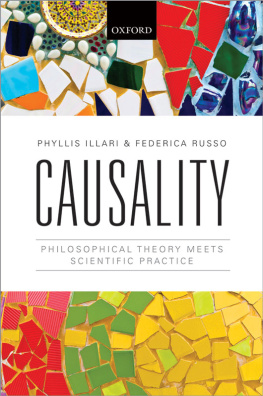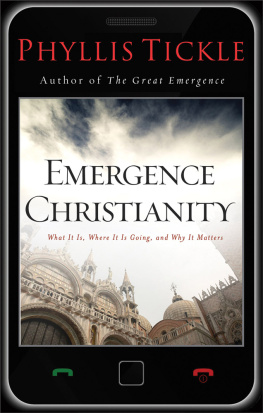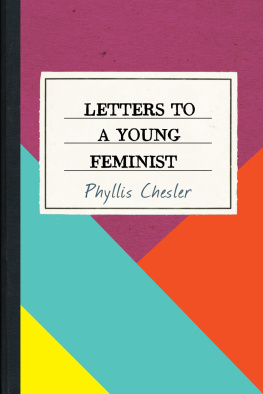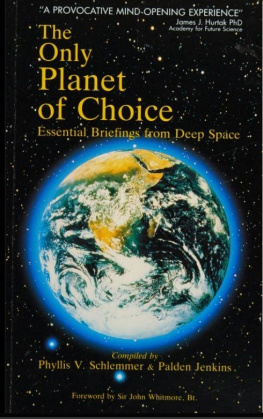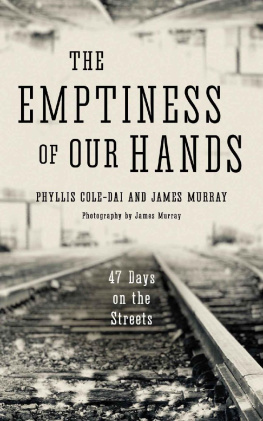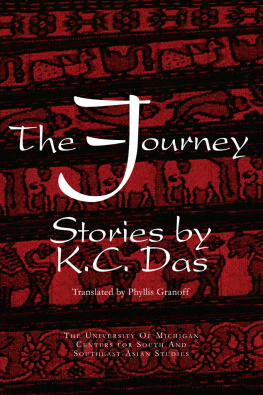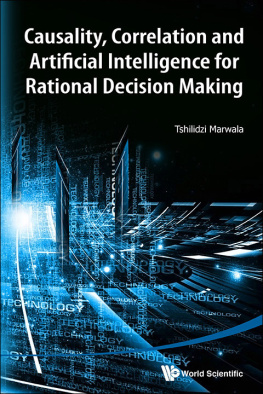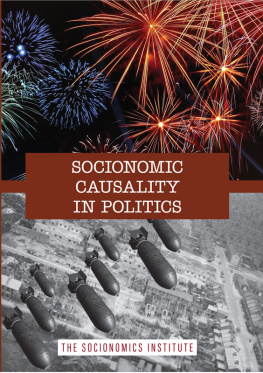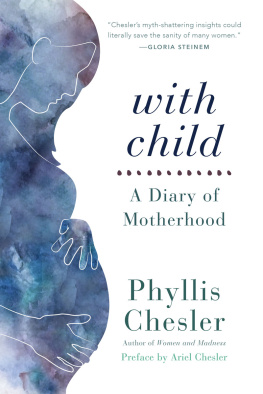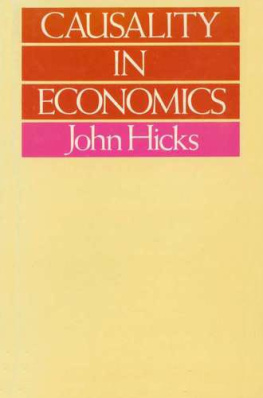Illari Phyllis - Causality
Here you can read online Illari Phyllis - Causality full text of the book (entire story) in english for free. Download pdf and epub, get meaning, cover and reviews about this ebook. year: 2014, publisher: Oxford University Press, genre: Children. Description of the work, (preface) as well as reviews are available. Best literature library LitArk.com created for fans of good reading and offers a wide selection of genres:
Romance novel
Science fiction
Adventure
Detective
Science
History
Home and family
Prose
Art
Politics
Computer
Non-fiction
Religion
Business
Children
Humor
Choose a favorite category and find really read worthwhile books. Enjoy immersion in the world of imagination, feel the emotions of the characters or learn something new for yourself, make an fascinating discovery.
- Book:Causality
- Author:
- Publisher:Oxford University Press
- Genre:
- Year:2014
- Rating:3 / 5
- Favourites:Add to favourites
- Your mark:
- 60
- 1
- 2
- 3
- 4
- 5
Causality: summary, description and annotation
We offer to read an annotation, description, summary or preface (depends on what the author of the book "Causality" wrote himself). If you haven't found the necessary information about the book — write in the comments, we will try to find it.
Causality — read online for free the complete book (whole text) full work
Below is the text of the book, divided by pages. System saving the place of the last page read, allows you to conveniently read the book "Causality" online for free, without having to search again every time where you left off. Put a bookmark, and you can go to the page where you finished reading at any time.
Font size:
Interval:
Bookmark:

Causality

Great Clarendon Street, Oxford, OX2 6DP,
United Kingdom
Oxford University Press is a department of the University of Oxford.
It furthers the Universitys objective of excellence in research, scholarship, and education by publishing worldwide. Oxford is a registered trade mark of Oxford University Press in the UK and in certain other countries
Phyllis Illari and Federica Russo 2014
The moral rights of the authors have been asserted
First Edition published in 2014
Impression: 1
All rights reserved. No part of this publication may be reproduced, stored in a retrieval system, or transmitted, in any form or by any means, without the prior permission in writing of Oxford University Press, or as expressly permitted by law, by licence or under terms agreed with the appropriate reprographics rights organization. Enquiries concerning reproduction outside the scope of the above should be sent to the Rights Department, Oxford University Press, at the address above
You must not circulate this work in any other form and you must impose this same condition on any acquirer
Published in the United States of America by Oxford University Press
198 Madison Avenue, New York, NY 10016, United States of America
British Library Cataloguing in Publication Data
Data available
Library of Congress Control Number: 2014939866
ISBN 9780191639685
Printed in Great Britain by
Clays Ltd, St Ives plc
Links to third party websites are provided by Oxford in good faith and for information only. Oxford disclaims any responsibility for the materials contained in any third party website referenced in this work.
To David. A Giuseppe.
Foreword
Causality has, of course, been one of the basic topics of philosophy since the time of Aristotle. However during the last two decades or so, interest in causality has become very intense in the philosophy of science community, and a great variety of novel views on the subject have emerged and been developed. This is admirable, but, at the same time, poses a problem for anyone who wants to understand recent developments in the philosophy of causality. How can they get to grips with this complicated and often very technical literature?
Fortunately, (Variation), there is a good presentation of Russos criticism of Humes regularity theory of causation, and an exposition of her view that variation rather than regularity is the underlying rationale for causation.
In the remainder of the book ( of an important, but rather neglected, question about the methodology of philosophy. Should philosophers consider toy examples or examples from science? The literature of the philosophy of causality is filled with the improbable adventures of Billy and Suzy, and one even finds purely imaginary examples such as Merlin causing a prince to turn into a frog. Are such toy examples really of much use for the analysis of causality? Given the authors Causality in the Sciences approach, one might expect them to prefer examples from science to toy examples, but, in fact, they provide a nuanced account in which there is room for both sorts of example. What is significant here is the consideration of an important topic, which is rarely discussed.
of the book draws some general conclusions. The authors favour a pluralist view of causality. There is no universal notion of causality, which applies in all contexts, but each of the various analyses of causality does apply in some particular contexts. In the authors own words (p. 256):
All we are saying is that the full array of concepts of causality developed within philosophy could very well be of interest to practising scientists
So when trying to apply causality to any particular scientific example, there is a need to construct what the authors call, in a striking phrase, a causal mosaic. They then illustrate the construction of a causal mosaic by considering an example from contemporary science. This is the new research area called exposomics which attempts to find out how exposure to objects of various kinds can cause illnesses. Thus the authors title Causality is not a rhetorical flourish, but a programme, which is actually carried out in the course of the book.
Donald Gillies
Emeritus Professor of Philosophy of Science and Mathematics
University College London
March 2014
Acknowledgements
We started working on the idea for this book while we were both at the University of Kent, where we shared not only an office but also a flat. This created intensive collaboration between us (and a no causality after 8pm! rule that Lorenzo Casini will also remember). Although we have since moved to different institutionsand countrieswe are deeply indebted to the information and communication technologies that allowed our weekly meetings to take place anyway.
We are most grateful to the editors at OUP who have shown enthusiasm about this project from the very beginning: Beth Hannon, Clare Charles and Keith Mansfield.
Several people read the book at several stages, even as an embryonic book proposal. Their comments, suggestions and criticisms have been invaluable to us. We offer profound thanks to: Prasanta Bandyopaday, Christos Bechlivanidis, Neil Bramley, Silvia Crafa, Roland Ettema, Matt Farr, Alex Freitas, Luciano Floridi, Toby Friend, Tobias Gerstenberg, Stuart Glennan, David Lagnado, Bert Leuridan, Michel Mouchart, John Pemberton, Julian Reiss, Attilia Ruzzene, Paolo Vineis, Adam White, Jon Williamson, Guillaume Wunsch, and especially Donald Gillies and Ian McKay who read the first complete draft cover to cover. They often led us to rethink the structure and rhetoric of the book, which are immeasurably better for their dedication. We would also like to thank the Causality in the Sciences networkboth steering committee and attendees over the last eight yearsfor the very valuable discussions that helped form so many ideas here. We apologize if we have missed anyone, and naturally acknowledge that remaining errors are our own.
During the academic year 201213, Federica Russo was Pegasus Marie Curie Fellow, funded by the Fonds Wetenschappelijk Onderzoek (Flemish Research Foundation), while Phyllis Illari was supported by the Arts and Humanities Research Council. During the academic year 20132014, Federica Russo was Reseacher at the University of Ferrara.
We have worked closely together on the structure of the book and then on the contents; writing and re-writing, commenting, manipulating and polishing each others work. In the pages you are about to read, it is really hard to identify the work of one or other of us. The result is that writing it has been enormous fun!
Finally, our deepest thanks go to David and Giuseppe. You know why.
, and the tables in the appendix are the result of many revisions and intensive co-writing.
In this part of the book we introduce and illustrate five scientific problems of causality that the accounts, concepts, and methods of have to deal with. We also provide a basic scientific and philosophical toolbox to be used throughout the book.
Many of the sciences spend much of their time looking for causesfrom causes of disease, to climate change, to earthquakes, to house price bubbles. Finding such causes, and deciding what to do about them, such as creating sustainable sources of energy, is not at all easy. Though these things are sometimes called causes, sometimes less loaded names such as risk factors, determinants, associations, and so on are used. Whatever they are called, they are really important, and it is worth everyone thinking about these issues at some point in their lives, academic studies or careers.
Font size:
Interval:
Bookmark:
Similar books «Causality»
Look at similar books to Causality. We have selected literature similar in name and meaning in the hope of providing readers with more options to find new, interesting, not yet read works.
Discussion, reviews of the book Causality and just readers' own opinions. Leave your comments, write what you think about the work, its meaning or the main characters. Specify what exactly you liked and what you didn't like, and why you think so.

